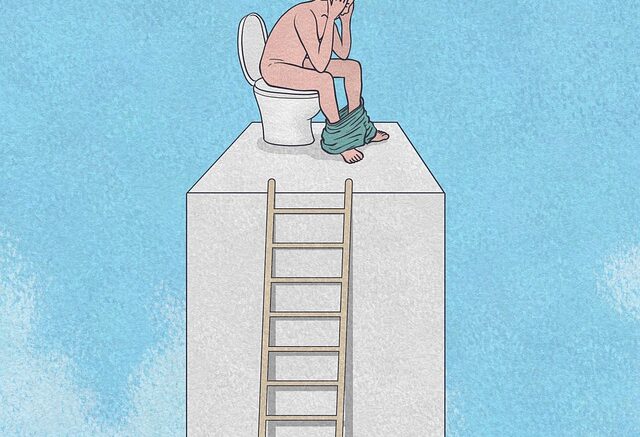Home Remedies for Constipation – Overview
Have you ever suffered from dry stools with less frequent bowel movements every week? You’re constipated and need to do something about it if you don’t want to suffer for a long time.
Before rushing to the doctor over your problematic bowel movement, why not try these common home remedies?
1. Hydrate Regularly

Home remedies for constipation: Staying hydrated
If you’re constantly dehydrated, this often leads to constipation. The simple cure is to drink lots of water every day.
Some who suffer from frequent constipation try to address it by drinking carbonated drinks. They think doing so will help them relieve constipation, but it worsens the problem.
Those suffering from irritable bowel syndrome (IBS) even find soda and other carbonated drinks aggravating their condition. So, try one of the simplest home remedies for constipation – drinking water.
2. Exercise
According to studies, a sedentary lifestyle makes people more prone to constipation, although more research is needed.
Even something as simple as walking or running around the block can move your colon and intestine muscles, which helps with bowel movement.
Do at least 150 minutes of aerobic exercise every week, so target at least 30 minutes every day for five days. Work out regularly to reduce the signs of constipation and eventually prevent it from occurring again.
This should make it to your list of home remedies for constipation if you want to avoid the condition and maintain a healthy weight at the same time.
3. Add More Fiber to Your Diet
Fiber is a crucial part of preventing the discomfort of being constipated. Make sure that you’re eating a good mix of insoluble and soluble fibers.
The former gives your stool some bulk, hastening its movement through the digestive system. On the other hand, the latter soaks and absorbs water, softening the stool in the process.
Include more easily digestible and fiber-rich foods in your diet, such as bananas, avocados, prunes, and berries.
Add more whole grains, fruits, and vegetables to your diet to prevent constipation. You can also take a fiber supplement like psyllium husk, one of your go-to home remedies for constipation.
4. Consume More Prebiotic Foods
Prebiotics are also fiber, but they’re the indigestible carbohydrate kind. They promote digestive health by helping beneficial bacteria to thrive in the gut. Prebiotics also improve bowel movements and soften stool.
You can try bananas, chicory, onions, chickpeas, Jerusalem artichokes, garlic, leeks, and chickpeas.
5. Take Magnesium Supplements
When taken, magnesium supplements can also stop constipation, thanks to their osmotic laxative properties. They effectively soften the stool, so if you cannot get them from your usual food sources, it would be better to take them as magnesium capsules.
Fortunately, foods rich in magnesium are also rich in fiber, such as dark leafy green vegetables and whole grains.
Remember to consult your doctor first if you have kidney issues before using this among your home remedies for constipation.
6. Eat More Prunes
Prunes are a natural relief for constipation, partly because they contain sorbitol, which is a laxative for the body. Prunes may even work better than psyllium husk, according to some studies.
Consume around 50 grams of prunes twice a day to see results.
However, you might want to skip this from your list of home remedies if you have IBS. Prunes have high sugar and alcohol levels making them high-FODMAP foods that IBS patients should avoid.
7. Consume Probiotic Foods
Chronic constipation doesn’t have to stop you from living your life when you can remedy it with probiotics.
These live bacteria bring balance to your gut, improving constipation in the process. They also release short-chain fatty acids that promote healthy gut movements, which allows you to pass stools more easily than before.
Eat more yogurt, kimchi, or sauerkraut as one of the top home remedies for constipation. You can also consider probiotic supplements.
8. Don’t Eat Dairy Products
If you are lactose intolerant, avoid dairy products entirely. Otherwise, you’ll deal with constipation frequently.
Consult with your doctor if you suspect you have lactose intolerance. Do the same for your kids if you see signs in them, too, such as constipation, stomach pain, diarrhea, bloating, vomiting, gas, and nausea.
9. Change Your Diet
Constipation is one of IBS’s signs, but you can try to address it with a low FODMAP diet.
This diet includes eating vegetables, such as alfalfa sprouts, bok choy, cucumber, green beans, carrots, eggplant, and more. It also includes fresh fruits like kiwi, grapefruit, grapes, oranges, lime, and oranges.
The low FODMAP diet also means eating lactose-free milk, cheeses, grains, and soy products. Nuts and seeds, non-dairy milk, and drinks like coffee, tea, water, and fruit juice also made it to this list.
Consider these tips if you want to stop the pain and discomfort of constipation. Eventually, you’ll see the change and not associate bathroom breaks with the negative memories of less frequent bowel movements.
